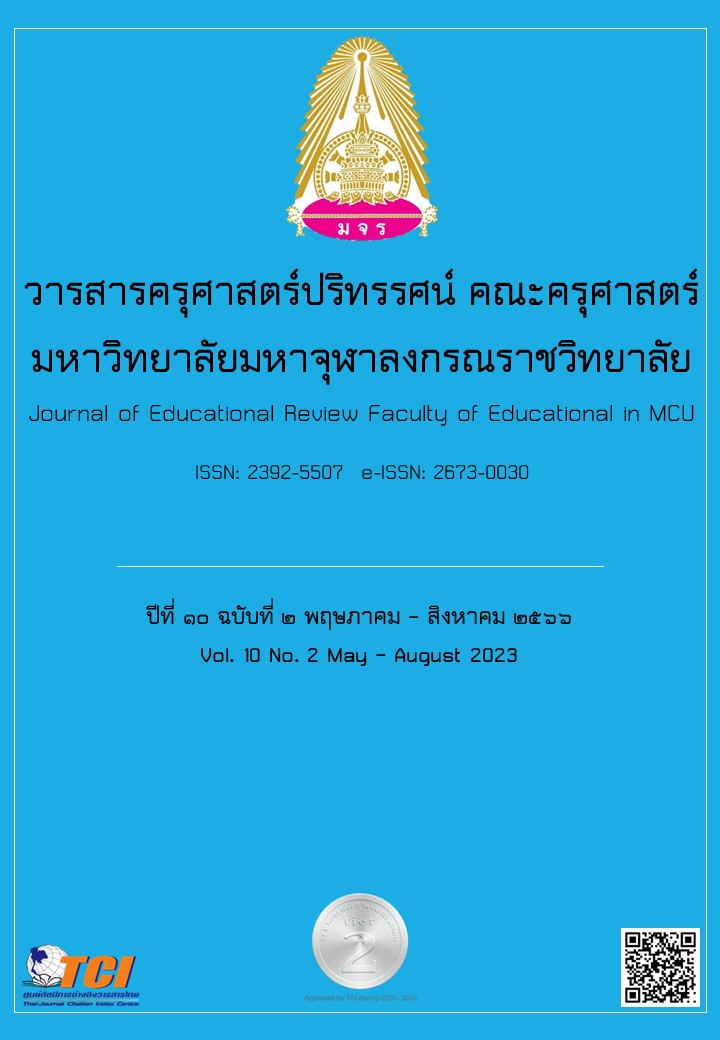THE DEVELOPMENT OF EDUCATIONAL INSTITUTION ADMINISTRATOR COMPETENCY MODEL IN INNOVATIVE LEARNING MANAGEMENT FOR ELECTRONIC PROFESSION TEACHERS IN INSTITUTE OF VOCATIONAL EDUCATION, BANGKOK
Main Article Content
Abstract
The purpose of this research was to develop and evaluate the competency model of educational institution administrator in innovative learning management of electronics vocational teachers in Institute of Vocational Education, Bangkok. The research methods comprised of three steps: Step 1: Studying the current state, desirable state, and the need for competency of educational institution administrators in innovative learning management of electronics vocational teachers in Institute of Vocational Education, Bangkok, Step 2: Developing the school administrator’s competency model in innovative learning management of electronics vocational teachers in Institute of Vocational Education, Bangkok, and Step 3: Conducting a pilot test and evaluating the feasibility and benefits of the model. The Sample group consists of executives of Vocational Education Institution, institute administrators, teachers, and heads of electronics department at vocational education institutes under Institute of Vocational Education, Bangkok. The sample size was determined by using Krejcie and Morgan’s table and a stratified random sampling method with the result of 51 participants. The research tools used were questionnaires, interviews, and evaluations. The data were analyzed using basic statistics and content analysis. The research results indicated that: 1) the current state and necessity of educational institution administrators’ competencies in innovative learning management of electronics profession teachers in Institute of Vocational Education, Bangkok were generally being practiced at a high level. 2) The developed model comprises of two components. The first component consists of five dimensions of competencies for educational institution administrators in managing innovation learning of electronics vocational teacher in Institute of Vocational Education, Bangkok, which are (1) Leadership (2) Strategic management (3) Learning management (4) Teamwork (5) Morality, Ethics, and Integrity. The second component is the process of managing innovative learning of electronics profession teachers, which is POLCD. 3) the overall evaluation results of the model are highly possible and beneficial.
Article Details

This work is licensed under a Creative Commons Attribution-NonCommercial-NoDerivatives 4.0 International License.
ทัศนะและความคิดเห็นที่ปรากฏในบทความในวารสารฉบับนี้ถือเป็นความรับผิดชอบของผู้เขียนบทความนั้นเพียงผู้เดียว และไม่ถือเป็นทัศนะและความรับผิดชอบของกองบรรณาธิการ
กองบรรณาธิการขอสงวนสิทธิ์ในการคัดเลือกบทความลงตีพิมพ์และจะแจ้งให้เจ้าของบทความทราบหลังจากผู้ประเมินบทความตรวจอ่านบทความแล้ว
ต้นฉบับที่ได้รับการตีพิมพ์ในวารสารครุศาสตร์ปริทรรศน์ คณะครุศาสตร์ มหาวิทยาลัยมหาจุฬาลงกรณราชวิทยาลัย ถือเป็นกรรมสิทธิ์ของคณะครุศาสตร์ มหาวิทยาลัยมหาจุฬาลงกรณราชวิทยาลัย ห้ามนำข้อความทั้งหมดหรือบางส่วนไปพิมพ์ซ้ำ เว้นเสียแต่ว่าจะได้รับอนุญาตจากมหาวิทยาลัยฯ เป็นลายลักษณ์อักษร
References
จิดาภา เร่งมีศรีสุข และคณะ. (2564). รูปแบบการพัฒนาหลักสูตรฝึกอบรมส่งเสริมศักยภาพครูไทยในศตวรรษที่ 21. วารสารสังคมศาสตร์และมานุษยวิทยาเชิงพุทธ. 5(11). 288-301.
ชลัท อุยถาวรยิ่ง. (2558). การพัฒนาหลักสูตรฝึกอบรมรูปแบบการสอนวิชาโครงการแบบมีส่วนร่วมของชุมชนโดยวิธีผสมผสาน. ดุษฎีนิพนธ์ปรัชญาดุษฎีบัณฑิต. มหาวิทยาลัยเทคโนโลยีพระจอมเกล้าพระนครเหนือ.
ชวนพิศ สิทธิ์ธาดา. (2552). รูปแบบสมรรถนะของผู้บริหารสถานศึกษาขั้นพื้นฐานที่มีประสิทธิผล. ดุษฎีนิพนธ์ปรัชญาดุษฎีบัณฑิต. มหาวิทยาลัยศิลปากร.
นภาเดช บุญเชิดชู. (2553). รูปแบบการพัฒนาสมรรถนะของผู้บริหารโรงเรียนตามมาตรฐานวิชาชีพทางการศึกษา. ดุษฎีนิพนธ์ครุศาสตรดุษฎีบัณฑิต. จุฬาลงกรณ์มหาวิทยาลัย.
บุรีรักษ์ คุ้มกลาง. (2564). รูปแบบการพัฒนาสมรรถนะผู้บริหารมืออาชีพของผู้บริหารสถานศึกษาสังกัดกรุงเทพมหานคร. วารสารสังคมศาสตร์และมานุษยวิทยาเชิงพุทธ. 5(11). 244-54.
พระมหาญาณวัฒน์ ฐิตวฑฺฒโน และศุขภิญญา ศรีคำไทย. (2565). การบูรณาการหลักพุทธธรรมกับสมรรถนะของผู้บริหารสถานศึกษา. วารสารบวรสหการศึกษาและมนุษยสังคมศาสตร์. 3(1). 70-77.
วิโรจน์ สารรัตนะ. (2556). กระบวนทัศน์ใหม่ทางการศึกษา กรณีทัศนะต่อการศึกษาศตวรรษที่ 21. กรุงเทพมหานคร: ทิพยวิสุทธิ์.
ศิลปกรณ์ จันทไชย (2553) สมรรถนะผู้บริหารโรงเรียนที่ส่งผลต่อประสิทธิผลการบริหารโรงเรียนสังกัดสำนักงานเขตพื้นที่การศึกษาในจังหวัดนครพนม. วารสารมหาวิทยาลัยราชภัฏสกลนคร. 2(4). 152-166.
สำนักงานคณะกรรมการการอาชีวศึกษา. (2542). พระราชบัญญัติการศึกษาแห่งชาติ พ.ศ. 2542. กรุงเทพมหานคร: พริกหวานกราฟฟิค.
สำนักงานคณะกรรมการการอาชีวศึกษา. (2551). กรอบทิศทางการพัฒนาการศึกษาในช่วงแผนพัฒนาเศรษฐกิจและสังคมแห่งชาติ ฉบับที่ 10 (พ.ศ. 2550-2554) ที่สอดคล้องกับแผนการศึกษาแห่งชาติ (พ.ศ. 2554-2559). กรุงเทพมหานคร: สำนักพิมพ์แห่งจุฬาลงกรณ์มหาวิทยาลัย.
Krejcie, R. V., & Morgan, D. W. (1970). Determining sample size for research activities. Educational and Psychological Measurement. 30(3). 607–610.
Spencer, L. M.; & Spencer, S. M. (1993). Competency at Work: Models for Superior Performance. New York: John Wiley & Sons.


